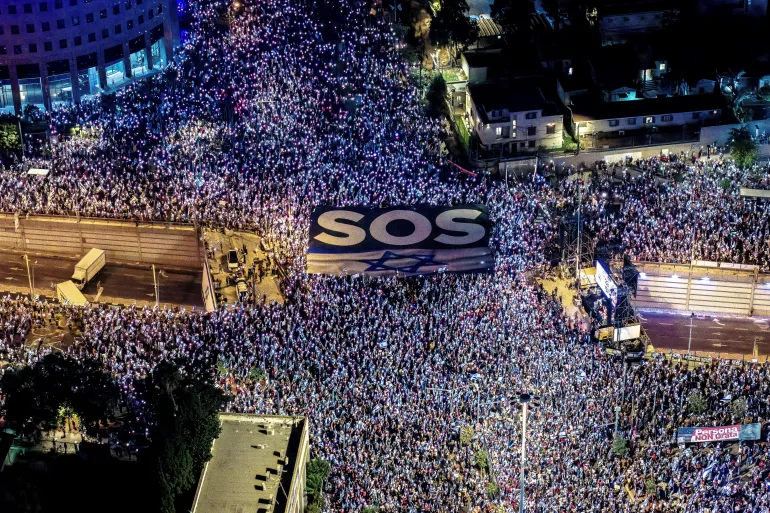Widespread protests have taken the forefront in cities across Israel, including Tel Aviv, as Benjamin Netanyahu’s right-wing administration drives forward with its contentious judiciary reform plan. This past Saturday marked 28 consecutive weeks of protests against the proposal, following an initial go-ahead by the government for a crucial component of the reform plan.
The proposed bill, having cleared its first reading, seeks to diminish the “reasonability” clause – a mechanism that enables the judiciary to invalidate government mandates. Additionally, it would enhance governmental influence in the judge selection process. Two more rounds of approval, anticipated to take place before the end of this month, are required for the bill to be enacted into law.

Tel Aviv became a canvas of protest with a colossal “SOS” banner and the sky painted with pink and orange hues from thrown paint powder. “Handmaids,” women clad in red dresses symbolic of characters from the dystopian novel and TV series, “The Handmaid’s Tale,” made a stark statement to highlight potential implications for women’s rights if the reform is approved.
Protester Nili Elezra, 54, voiced her concerns to the AFP news agency, emphasizing the grave implications for Israel’s democratic standing and potential economic repercussions. Fears of dwindling international relations, investment withdrawal, and escalating emigration were among her concerns.
The wave of protests wasn’t confined to Tel Aviv. Demonstrators, brandishing burning torches, gathered outside Netanyahu’s residence in Jerusalem and rallied in Herzliya and Netanya, coastal cities of Israel. Protest organizers have also announced plans for a “day of disruption” on Tuesday if the plan persists.
The protests coincided with Netanyahu’s hospital admission due to dehydration, following a day of high sun exposure and inadequate hydration. Despite his hospital stay, he reassured his condition was stable via a video from the hospital in Tel Aviv.
The controversial judiciary reform, suspended in March due to protests and international backlash, was reintroduced following the breakdown of bipartisan dialogues last month. Yet, opposition remains steadfast.
The persistent protest movement, active for over half a year, shows no signs of waning. Key figures such as military reservists, business tycoons, and organizations like the national labor union and the medical association, have all expressed disapproval. Arnon Bar-David, the leader of the national labor union, even hinted at a potential national strike, which could cripple the country’s economy.
This dissent doesn’t stop there. The Israeli Medical Association, representing 90% of Israeli physicians, pledged to utilize every available means to resist the reasonableness bill, citing potentially detrimental impacts on the healthcare system.
Elad Ziv, a protestor and programmer, told AFP that the forthcoming weeks are pivotal for blocking the reform. The protest’s size does matter, he said, as it bolsters those contesting the bill.





